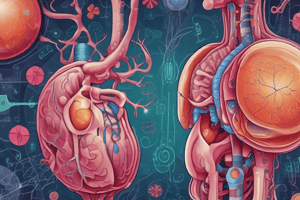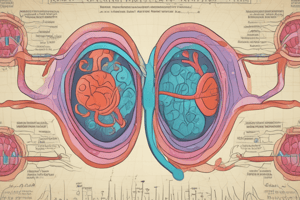Podcast
Questions and Answers
What is the primary function of the kidneys in the body?
What is the primary function of the kidneys in the body?
- Producing hormones that regulate blood pressure and red blood cell production
- Filtering waste and excess fluids from the blood (correct)
- Storing nutrients for future use
- Regulating body temperature
Which of the following kidney diseases is characterized by a gradual loss of kidney function over time?
Which of the following kidney diseases is characterized by a gradual loss of kidney function over time?
- Chronic Kidney Disease (CKD) (correct)
- Glomerulonephritis
- Acute Kidney Injury (AKI)
- Nephrotic Syndrome
What is the purpose of a kidney biopsy?
What is the purpose of a kidney biopsy?
- To measure creatinine and urea levels in the blood
- To visualize the kidneys and urinary tract
- To obtain a kidney tissue sample for microscopic examination (correct)
- To detect proteinuria and hematuria in the urine
Flashcards are hidden until you start studying
Study Notes
Definition and Scope
- Nephrology is the branch of medicine that deals with the diagnosis, treatment, and management of kidney diseases and disorders.
- Nephrologists are medical doctors who specialize in the care of patients with kidney problems.
Kidney Functions
- The kidneys play a crucial role in:
- Filtering waste and excess fluids from the blood
- Regulating electrolyte levels (e.g., sodium, potassium, calcium)
- Maintaining acid-base balance
- Producing hormones that regulate blood pressure and red blood cell production
- Filtering waste and excess fluids from the blood
Common Kidney Diseases and Disorders
- Chronic Kidney Disease (CKD): a gradual loss of kidney function over time, often caused by diabetes, hypertension, or glomerulonephritis.
- Acute Kidney Injury (AKI): a sudden and temporary loss of kidney function, often caused by trauma, infection, or medication.
- Glomerulonephritis: inflammation of the glomeruli, the tiny blood vessels in the kidneys that filter waste and excess fluids.
- Nephrotic Syndrome: a group of symptoms that include proteinuria, edema, and lipiduria.
- Kidney Stones: small, hard mineral deposits that form in the kidneys and can cause severe pain.
- End-Stage Renal Disease (ESRD): the final stage of CKD, requiring dialysis or kidney transplantation.
Diagnostic Tests and Procedures
- Urine Tests: used to detect proteinuria, hematuria, and other abnormalities.
- Blood Tests: used to measure creatinine, urea, and electrolyte levels.
- Imaging Studies: used to visualize the kidneys and urinary tract, such as ultrasound, CT, and MRI scans.
- Biopsy: a surgical procedure to obtain a kidney tissue sample for microscopic examination.
Treatment Options
- Medications: used to manage symptoms, slow disease progression, and treat underlying conditions.
- Dialysis: a mechanical filtration process used to remove waste and excess fluids from the blood.
- Kidney Transplantation: a surgical procedure to replace a diseased kidney with a healthy one from a donor.
- Lifestyle Modifications: dietary changes, fluid management, and stress reduction to slow disease progression.
Definition and Scope
- Nephrology is the branch of medicine that deals with kidney diseases and disorders.
- Nephrologists are medical doctors who specialize in caring for patients with kidney problems.
Kidney Functions
- Filtration of waste and excess fluids from the blood
- Regulation of electrolyte levels (e.g., sodium, potassium, calcium)
- Maintenance of acid-base balance
- Production of hormones that regulate blood pressure and red blood cell production
Common Kidney Diseases and Disorders
- Chronic Kidney Disease (CKD): gradual loss of kidney function over time, often caused by diabetes, hypertension, or glomerulonephritis
- Acute Kidney Injury (AKI): sudden and temporary loss of kidney function, often caused by trauma, infection, or medication
- Glomerulonephritis: inflammation of glomeruli, tiny blood vessels in the kidneys that filter waste and excess fluids
- Nephrotic Syndrome: symptoms include proteinuria, edema, and lipiduria
- Kidney Stones: small, hard mineral deposits that form in the kidneys, causing severe pain
- End-Stage Renal Disease (ESRD): final stage of CKD, requiring dialysis or kidney transplantation
Diagnostic Tests and Procedures
- Urine Tests: detection of proteinuria, hematuria, and other abnormalities
- Blood Tests: measurement of creatinine, urea, and electrolyte levels
- Imaging Studies: visualization of kidneys and urinary tract using ultrasound, CT, and MRI scans
- Biopsy: surgical procedure to obtain kidney tissue sample for microscopic examination
Treatment Options
- Medications: management of symptoms, slowing disease progression, and treatment of underlying conditions
- Dialysis: mechanical filtration process to remove waste and excess fluids from the blood
- Kidney Transplantation: surgical procedure to replace diseased kidney with a healthy one from a donor
- Lifestyle Modifications: dietary changes, fluid management, and stress reduction to slow disease progression
Studying That Suits You
Use AI to generate personalized quizzes and flashcards to suit your learning preferences.




